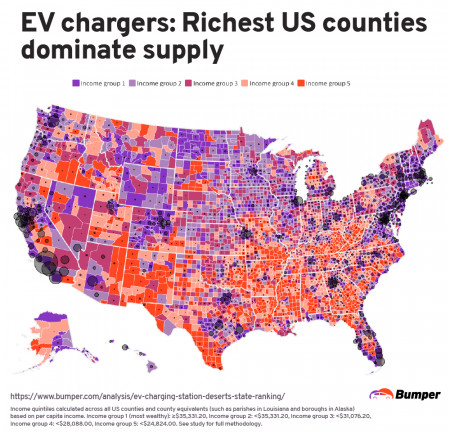Bumper Study: More Than 70% of Public EV Charge Ports Are in America's Wealthiest Counties

NEW YORK, April 17, 2023 (Newswire.com) - By 2030, the Biden Administration set a goal for 50% of all new-vehicle sales to be electric. A newly released study from Bumper, the go-to for low-cost vehicle history reports and a platform for buying, selling and owning a vehicle, shows electric vehicle charging stations and charge ports across the U.S. are in short supply, largely underscored by income and racial disparities. More than 70% of public EV charge ports are in America's wealthiest counties, and 96% are in majority-white counties.
Looking at a range of socioeconomic factors (see Methodology), Bumper found the following insights.
Key takeaways
- States that fall within the highest per capita income have more chargers on average per 10,000 people. Nevada (499% more chargers than average), Colorado (339%), D.C. (337%), Vermont (336%) and California (316%) have the most chargers per 10,000 people.
- The national average for charge ports per 10,000 people is 2.4, but 60% of counties with the lowest income have no EV chargers at all. The five states with the lowest income — Mississippi (0.71 chargers/10,000 people), Arkansas (1.24), Kentucky (0.71), Alabama (0.91) and Louisiana (0.46) — all have less than two chargers per 10,000 people.
- Predominantly white communities have 3.03 charge ports per 10,000 people. That's more than double the number of charge ports available to Black or African American counties and 2.7 times more than counties with an American Indian and Alaskan native majority.
"Many Americans hesitate buying an EV because of the initial upfront cost," said Kerry Sherin, a Senior PR and data insights manager for Bumper. "For Americans living in socioeconomically distressed communities, they have the added concern of access to convenient EV charging stations. We hope our analysis will shine a light on the work that still needs to be done to make electric vehicle adoption an attainable goal for all Americans."
To determine county quintiles, Bumper created the Distressed County Index, determined by nine metrics of economic health and prosperity across counties in each state.
Bumper is using inter-state quartiles, comparing counties only within the same state on a quintile basis. The metrics used are from the American Community Survey (ACS) 5-year 2021 dataset and are as follows:
- Percent of the population with no diploma
- Percent of the population below the poverty level
- Percent of the non-institutionalized civilian population without health insurance
- Percent of occupied housing units without access to indoor plumbing
- Percent of occupied housing units without access to a car
- Percent of the population using SNAP benefits
- Percentage of the population that is unemployed
- Percent of vacant housing units
- Per capita income (dollars)
For Bumper's income analysis, it categorized into income quintiles all U.S. counties and county equivalents (such as parishes in Louisiana and boroughs in Alaska) based on per capita income. Bumper used inter-state quartiles, comparing counties only within the same state on a quintile basis.
Income group 1: ≥$35,331.20
Income group 2: <$35,331.20
Income group 3: <$31,076.20
Income group 4: <$28,088
Income group 5: <$24,824
Bumper then analyzed the counties that were home to 131,195 charge ports at 51,012 public, open EV stations, according to the National Renewable Energy Laboratory. Excludes Puerto Rico. Figures were current as of March 15, 2023. Per capita figures represent average number charge ports per 10,000 population.
Population was based using the members of the population who reported being only one race in the American Community Survey 5-year estimates by the U.S. Census.
About Bumper
Bumper's mission is simple: make the car-owning, buying and selling experience better and more affordable through vehicle history reports for one low cost. Membership also unlocks access to detailed information on accidents, recalls, market value and easy-to-use tools available online or through the Bumper.com mobile app. Follow Bumper on TikTok, Instagram, LinkedIn, YouTube, Facebook and Twitter. For partnership inquiries, email partners@bumper.com.
Media Contact:
Kerry Sherin or Erin Kemp
press@bumper.com
Source: Bumper
